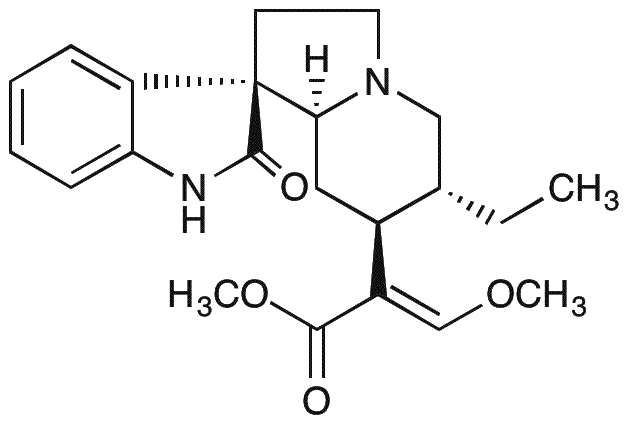Rhynchophylline is widely utilized in research focused on:
- Neuroprotection: This compound has shown potential in protecting neurons from damage, making it valuable in studies related to neurodegenerative diseases such as Alzheimer's and Parkinson's.
- Anti-inflammatory Applications: Rhynchophylline exhibits anti-inflammatory properties, which can be beneficial in developing treatments for chronic inflammatory conditions, particularly in the fields of rheumatology and immunology.
- Cardiovascular Health: Research indicates that this compound may help improve cardiovascular function, making it relevant for studies aimed at heart disease prevention and treatment.
- Traditional Medicine: Traditionally used in herbal medicine, rhynchophylline is gaining attention for its potential therapeutic effects, particularly in Asian medicine, where it is utilized for various ailments.
- Research on Addiction: Emerging studies suggest that rhynchophylline may play a role in reducing addiction behaviors, particularly in relation to nicotine and other substances, thus offering a new avenue for addiction treatment research.
General Information
Properties
Safety and Regulations
Applications
Rhynchophylline is widely utilized in research focused on:
- Neuroprotection: This compound has shown potential in protecting neurons from damage, making it valuable in studies related to neurodegenerative diseases such as Alzheimer's and Parkinson's.
- Anti-inflammatory Applications: Rhynchophylline exhibits anti-inflammatory properties, which can be beneficial in developing treatments for chronic inflammatory conditions, particularly in the fields of rheumatology and immunology.
- Cardiovascular Health: Research indicates that this compound may help improve cardiovascular function, making it relevant for studies aimed at heart disease prevention and treatment.
- Traditional Medicine: Traditionally used in herbal medicine, rhynchophylline is gaining attention for its potential therapeutic effects, particularly in Asian medicine, where it is utilized for various ailments.
- Research on Addiction: Emerging studies suggest that rhynchophylline may play a role in reducing addiction behaviors, particularly in relation to nicotine and other substances, thus offering a new avenue for addiction treatment research.
Documents
Safety Data Sheets (SDS)
The SDS provides comprehensive safety information on handling, storage, and disposal of the product.
Product Specification (PS)
The PS provides a comprehensive breakdown of the product’s properties, including chemical composition, physical state, purity, and storage requirements. It also details acceptable quality ranges and the product's intended applications.
Certificates of Analysis (COA)
Search for Certificates of Analysis (COA) by entering the products Lot Number. Lot and Batch Numbers can be found on a product’s label following the words ‘Lot’ or ‘Batch’.
*Catalog Number
*Lot Number
Certificates Of Origin (COO)
This COO confirms the country where the product was manufactured, and also details the materials and components used in it and whether it is derived from natural, synthetic, or other specific sources. This certificate may be required for customs, trade, and regulatory compliance.
*Catalog Number
*Lot Number
Safety Data Sheets (SDS)
The SDS provides comprehensive safety information on handling, storage, and disposal of the product.
DownloadProduct Specification (PS)
The PS provides a comprehensive breakdown of the product’s properties, including chemical composition, physical state, purity, and storage requirements. It also details acceptable quality ranges and the product's intended applications.
DownloadCertificates of Analysis (COA)
Search for Certificates of Analysis (COA) by entering the products Lot Number. Lot and Batch Numbers can be found on a product’s label following the words ‘Lot’ or ‘Batch’.
*Catalog Number
*Lot Number
Certificates Of Origin (COO)
This COO confirms the country where the product was manufactured, and also details the materials and components used in it and whether it is derived from natural, synthetic, or other specific sources. This certificate may be required for customs, trade, and regulatory compliance.


